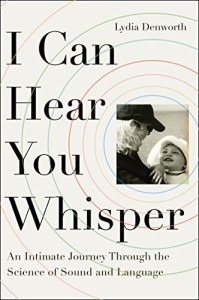 To my interns current and former:
To my interns current and former:
First, I hope you all are doing well and finding plenty of opportunity to interpret.
Second, I want to share with you a book I recently read that is valuable in understanding hearing and deafness from a perspective different than the traditional interpreting perspective and completely valid.
I Can Hear You Whisper by Lydia Denworth is a mother’s journey in navigating the worlds surrounding deafness after her third son was born deaf. Ms. Denworth’s day job is as a science writer and so she knows how to thoroughly research scientific aspects of a subject and presents them in a narrative easy for the public to understand. What Ms. Denworth does in I Can Hear You Whisper is almost magical.The book is a love story to her son, a prayer that he will have opportunities equal to his hearing older brothers, and a navigation through deafness historically, culturally and scientifically. We, as interpreters, claim the moral high ground around deafness saying that we accept Deaf people as whole people while we assume audiologists, ENTs, and even hearing parents of Deaf don’t see our people as whole. I urge you to keep an open mind while reading this book because you’ll see a mom who loves her son so completely that he becomes her life’s work for the better part of a decade. You’ll see doctors impacted by hearing loss trying to do their best to bring communication back to people they love. You’ll see the dynamics of Deaf culture through a different lens–the lens of a mother wondering if her son will abandon the family home for another culture and trying to decipher the new culture.
Ms. Denworth sits down with the inventors of Cochlear implants, neurologists who research hearing, staff and Gallaudet and RIT. She talks about the Deaf woman she hired to teach her family sign language as well as how scary it was for her and her son when he lost what residual hearing he had. Through it all, she imagines who her son will be as an adult.
Ms. Denworth also talks plainly about the very real way that having less access to sound negatively impacts a person’s life socially and educationally. This is a very real impact that we, as interpreters like to brush over, but Ms. Denworth, as a mother, is extremely sensitive to.
If I were running an interpreter training program, I would have I Can Hear You Whisper as required reading. Barring that, I’m simply recommending it to all of you. If you read the book, please let me know what you think.









